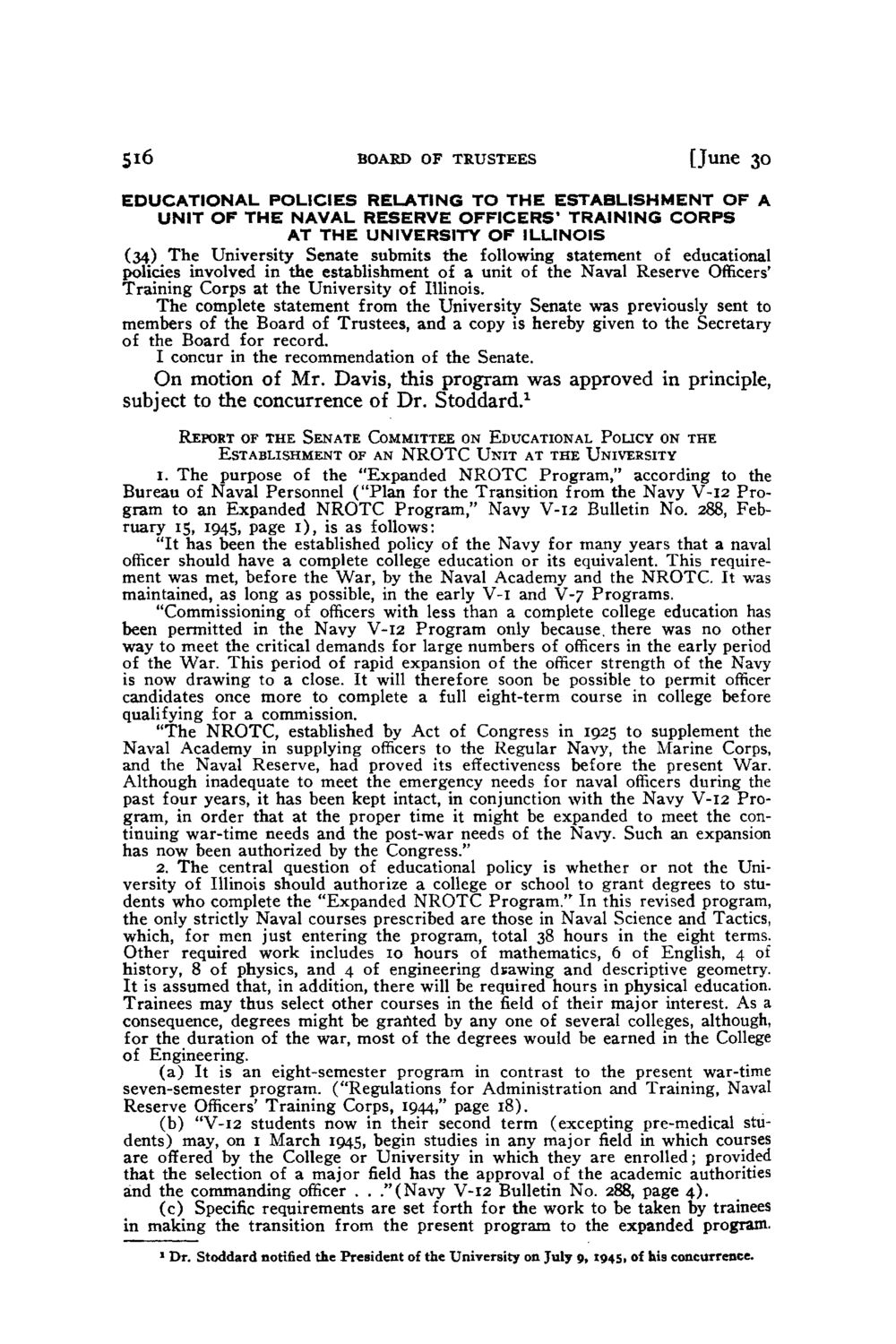| |
| |
Caption: Board of Trustees Minutes - 1946
This is a reduced-resolution page image for fast online browsing.

EXTRACTED TEXT FROM PAGE:
Si6 BOARD OF TRUSTEES [June 30 E D U C A T I O N A L P O L I C I E S RELATING T O T H E E S T A B L I S H M E N T O F A UNIT O F T H E NAVAL R E S E R V E O F F I C E R S ' TRAINING C O R P S AT T H E UNIVERSITY O F ILLINOIS (34) T h e University Senate submits t h e following statement of educational policies involved in the establishment of a unit of the Naval Reserve Officers' Training Corps at the University of Illinois. T h e complete statement from the University Senate was previously sent to members of the Board of Trustees, and a copy is hereby given to the Secretary of the Board for record. I concur in the recommendation of the Senate. On motion of Mr. Davis, this program was approved in principle, subject to the concurrence of Dr. Stoddard. 1 REPORT OF T H E SENATE COMMITTEE ON EDUCATIONAL POLICY ON THE ESTABLISHMENT OF AN N R O T C U N I T AT THE UNIVERSITY 1. T h e purpose of the "Expanded N R O T C Program," according to the Bureau of Naval Personnel ("Plan for the Transition from the Navy V-12 P r o gram to an Expanded N R O T C P r o g r a m , " Navy V-12 Bulletin No. 288, February 15, 1945, page 1 ) , is as follows: "It has been the established policy of the Navy for many years that a naval officer should have a complete college education or its equivalent. This requirement was met, before the W a r , by the Naval Academy and the N R O T C . It was maintained, as long as possible, in the early V - l and V-7 Programs. "Commissioning of officers with less than a complete college education has been permitted in the Navy V-12 P r o g r a m only because, there was no other way to meet the critical demands for large numbers of officers in the early period of the W a r . This period of rapid expansion of the officer strength of the Navy is now drawing to a close. It will therefore soon be possible to permit officer candidates once more to complete a full eight-term course in college before qualifying for a commission. " T h e N R O T C , established by Act of Congress in 1925 to supplement the Naval Academy in supplying officers to the Regular Navy, the Marine Corps, and the Naval Reserve, had proved its effectiveness before the present War. Although inadequate to meet the emergency needs for naval officers during the past four years, it has been kept intact, in conjunction with the Navy V-12 Program, in order that at the proper time it might be expanded to meet the continuing war-time needs and the post-war needs of the Navy. Such an expansion has now been authorized by the Congress." 2. T h e central question of educational policy is whether or not the University of Illinois should authorize a college or school to grant degrees to students who complete the "Expanded N R O T C P r o g r a m . " I n this revised program, the only strictly Naval courses prescribed are those in Naval Science and Tactics, which, for men just entering the program, total 38 hours in the eight terms. Other required work includes 10 hours of mathematics, 6 of English, 4 of history, 8 of physics, and 4 of engineering drawing and descriptive geometry. I t is assumed that, in addition, there will be required hours in physical education. Trainees may thus select other courses in the field of their major interest. As a consequence, degrees might be granted by any one of several colleges, although, for the duration of the war, most of the degrees would be earned in the College of Engineering. ( a ) It is an eight-semester program in contrast to the present war-time seven-semester program. ("Regulations for Administration and Training, Naval Reserve Officers' Training Corps, 1944," page 18). (b) "V-12 students now in their second term (excepting pre-medical students) may, on 1 March 1945, begin studies in any major field in which courses are offered by the College or University in which they are enrolled; provided that the selection of a major field has the approval of the academic authorities and the commanding officer . . . " ( N a v y V-12 Bulletin No. 288, page 4 ) . ( c ) Specific requirements are set forth for the work to be taken by trainees in making the transition from the present program to the expanded program. 1 Dr. Stoddard notified the President of the University on July 9, 1945, of his concurrence.
| |